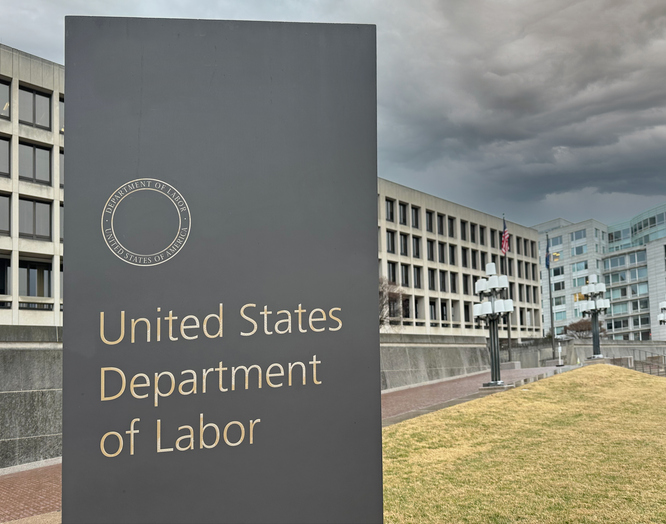President-elect Donald Trump is expected to make major changes to the federal government in his second term, including an overhaul of the workforce enforcement agencies such as the Equal Employment Opportunity Commission (EEOC) and the Department of Labor (DOL).
EEOC
The EEOC currently has three Democratic members including Chair Charlotte Burrows and one Republican, Andrea Lucas. It’s expected that EEOC General Counsel (GC) Karla Gilbride will be asked to resign or be fired by the incoming Trump administration much the same way President Joe Biden fired her predecessor, Sharon Gustafson, when she refused to resign in 2021. During the first Trump administration, Vicki Lipnic served as Acting Chair with the Democratic commissioners in the majority for two years until Janet Dhillon was confirmed in 2019.
The lack of a Republican majority for much of the second Trump term will limit the commission’s ability to revise the Pregnant Workers Fairness Act (PWFA) regulations, to withdraw controversial harassment guidance, or to refocus the agency on religious discrimination and anti-DEI litigation. If the Trump administration wants to move the Democratic commissioners out before the end of their terms, they may decide to fire them by arguing their terms violate the Appointment Clause of the Constitution. The courts have upheld President Biden’s firing of the EEOC and National Labor Relations Board (NLRB) GCs on that basis.
With the PWFA regulations and the harassment guidance in litigation across the country, it’s expected the Trump administration will withdraw the government’s support for the Biden administration positions and both will be eliminated.
Department of Labor
OFCCP. The Heritage Foundation’s Project 2025 recommended rescinding Executive Order (EO) 11246, which would eliminate both the affirmative action obligations for women and minorities and the Office of Federal Contract Compliance Programs (OFCCP) itself. Even if the president-elect decides not to rescind the entire EO 11246, he might rescind President Barack Obama’s EO 13672, which prohibited discrimination by federal contractors based on sexual orientation and gender identity as Project 2025 recommends.
If the OFCCP continues to exist after January 20, 2025, federal contractors can expect its focus to move from affirmative action for women and minorities to discrimination against white males and against employees’ religious beliefs. The first Trump administration OFCCP placed more emphasis on its obligations for individuals with disabilities and protected veterans as well as banning certain types of diversity, equity, and inclusion (DEI) training. With the anti-DEI movement gaining strength over the years since the first Trump term and with major anti-DEI activist Stephen Miller as his deputy chief of staff, the president-elect may do more to ban federal contractors from continuing their DEI activities.
Finally, even if the president-elect decides not to rescind EO 11246, the newly established Department of Government Efficiency (DOGE) may recommend merging the OFCCP into the EEOC as the Heritage Foundation did previously, which would require Congress to amend Section 503 of the Rehabilitation Act and the Vietnam Era Veterans’ Readjustment Assistance Act (VEVRAA).
Wage and Hour Division. The Biden administration issued updated overtime and independent contractor rules, which are currently being litigated across the country. Unusually the issue of overtime was discussed on the campaign trail by both presidential candidates, so the incoming Trump administration may have additional changes. Now that the Biden overtime rule has been blocked nationwide by a federal district judge in Texas, it’s unclear what overtime rule will apply moving forward.
The previous Trump administration independent contractor rule was rescinded by the new Biden independent contractor rule, so when the incoming Trump administration withdraws its support for the rule in litigation, it appears the previous Trump rule will be reinstated. The overtime rule is more complicated. It’s unclear whether the previous Trump overtime rule will be reinstated or whether the salary levels will go back to where they were prior to the Trump levels.
In addition to the president-elect’s promises to remove taxes on tips and overtime, Project 2025 recommends that Congress revise the Fair Labor Standards Act (FLSA) to allow employees to receive additional paid time off instead of overtime.
Conclusion
The workforce agencies are expected to at least revive the priorities of the first Trump administration. What is unclear is what other objectives of the administration—such the plans to cut senior federal government employees under Section F and to move 100,000 federal employees outside of Washington, D.C.—will do to the agencies’ ability to enforce the laws.
Written by the editors of the Federal Employment Law Insider.

